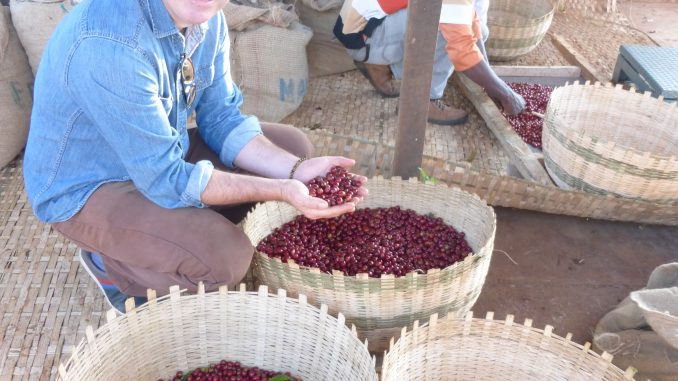
We continue our interview from the February + March 2016 Issue of Barista Magazine with Intelligentsia’s Geoff Watts

When we had a chance to interview Intelligentsia Coffee‘s V.P. Geoff Watts about his history in the coffee industry for our February + March 2016 issue we were left with more of the exchange than we could fit on the page. (You can read the February + March issue e-pub online for free here, or you order a hard copy through our online store here.)
At the end of the Master Q&A in the issue, we promised to print more of the interview right here on the Barista Magazine blog, and though it took a little longer than we thought it would, without further delay, here we go

Barista Magazine: Working as a green buyer and being so involved with projects to improve quality at origin, you must have needed some background in agronomy. Who did you learn about coffee agronomy from? Books? A mentor? Just self taught?
Geoff Watts: A mix of all of those. I learned a lot from the farmers we work with. Some of them have agronomy degrees, and others employ agronomists to help them. All of them have a lot of knowledge to share, and I just started asking as many questions as I could think of.
Early on I started doing some consulting work with different agricultural research organizations, like CIAT (the International Center for Tropical Agriculture), and was exposed to a tremendous wealth of knowledge through those experiences. Later I did a bunch of volunteer work in Rwanda with the PEARL/SPREAD project and got to spend loads of time with some extremely smart folks like Tim Schilling (Executive Director at World Coffee Research), and his network of scientists.
I’ve gotten heaps of insight from the talented agronomists at CMS in Kenya like Kamau Kuria, Martin Ngare and Peter Kimata. Almost everything I’ve learned about coffee agronomy has come from spending time with people like these, and picking their brains. I’ve had the good fortune of being close to so many brilliant coffee people over the years, and have tried to collect as much information as I could digest. But I still know very little compared to these giants.

BMag: When did you start traveling to Africa for coffee? What were your early experiences there? What successes and challenges did you see that African producers were facing that differed from what you’d seen in Central and South America?
GW: If I’m not mistaken my first trip was in 2002. I went to Rwanda at the invitation of some people from Michigan State University who were helping to fund the PEARL project. That’s where I met Tim Schilling, who became a great friend and invaluable source of knowledge and inspiration.
I was blown away by the challenges in Africa–compared to Latin America, the obstacles to success for farmers are at least three-fold. One, access to basic services and resources are often missing entirely. Two, corruption is deeply entrenched, and three, critical infrastructure is severely lacking in many places.
Electricity was unreliable. Clean water was hard to come by. And the bureaucracy can be stifling. A lot of potential income gets eaten up because of inefficiencies that stem from all of these obstacles. But perhaps the biggest challenge of all in many African countries is farm size; most farmers have just a few hundred trees, no land to expand with, and no money to invest so the path to getting a sustainable income is far from clear.
The production model is very different than most Latin American systems, because the huge majority of farmers are selling cherry rather than parchment coffee. That fundamentally changes the game–and it means different strategies need to be employed to create incentives for quality, improve farmer incomes, and track progress.
That said, there are some natural advantages that African producers enjoy over their Latin American counterparts. There is generally more available labor, more coffee varieties in the ground with high quality potential, and some of the countries in East Africa have exceptionally favorable climate conditions for producing quality.
We’ve got more with Geoff still to come including his thoughts on the ongoing threat of climate change and how farmers and coffee production must adapt to survive, and some of his favorite projects he’s worked on at Intelligentsia. It will go up right here on the BMag blog tomorrow.
He also asked us to make sure to include one other thing: He says Viviana Rico-Watts deserves a special shout-out, and we agree. She’s amazing. She’s his wife!

